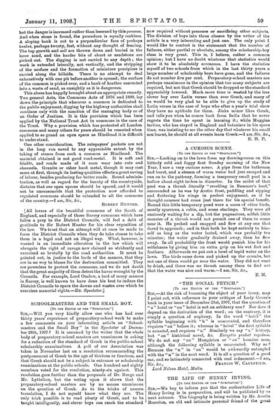SCHOOLMASTERS AND THE SMALL BOY.
[To THE EDITOR OF TER "SPECTATOR:1
Si,—Will you very kindly allow one who has had over thirty years' experience of preparatory-school work to make a few comments on your interesting article on " SChool- masters and the Small Boy" in the Spectator of Decem- ber 28th, 1907 ? It is assumed by the writer that the whole body of preparatory-school masters are unanimous in asking for a reduction of the standard of Greek in the public-school scholarship examinations. A poll of our Association was taken in November last on a resolution recommending the postponement of Greek to the age of thirteen or fourteen, and that Greek should not be a subject in entrance or scholarship examinations at the public schools. One hundred and eighty members voted for the resolution, ninety-six against. This resolution goes further than the proposals of Dr. Burge and Mr. Lyttelton, but the voting upon it shows that the preparatory-school masters are by no means unanimous on the question of Greek. As to the tricks of unseen translation, I do not myself know what they are. The only trick possible is to read plenty of Greek, and to be
• taught intelligently, and clever boys can reach the standard now required without pressure or sacrificing other subjects. The division of boys into three chums by the writer of the article is a very interesting and just one. The only point I would like to contest is the statement that the number of failures, either partial or absolute, among the scholarship-boy class is very great. This is, I believe, rather a common opinion; but I have no doubt whatever that statistics would show it to be absolutely erroneous. I have the statistics myself of two schools from which in the last thirty years a large number of scholarship boys have gone, and the failures do not number five per cent. Preparatory-school masters are perhaps unanimous in the opinion that too many subjects are required, but not that Greek should be dropped or the standard appreciably lowered. Much more time is wasted by the less clever boy over Latin verses than over Greek, and many of us would be very glad to be able to give up the study of Latin verses in the case of boys who after a. year's trial show they have no aptitude for them. Jinks minor likes Greek, and tells you when he comes back from India that he never regrets the time he spent in learning it; while Mugging tertius, who has stayed in England and botanises in his spare time, was insisting to me the other day that whatever his small son learnt, he should at all events learn Greek.—! am, Sir, 8co., E. H. P.










































 Previous page
Previous page